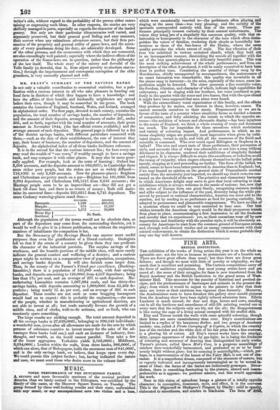MUSIC.
VOCAL PERFORMANCE OF THE HUTCHIMON FAMILY.
A. ancoND and more favourable specimen of the musical produce of ionerica than we lately noticed in the Ethiopians, was exhibited by the flisnily of this name, at the Hanover Square Rooms, on Tuesday. The group formed by three well-looking youths and their sister, unfurnished with any music, or any accompaniment save two violins and a- bass, which were occasionally resorted to—the performers often playing and singing at the same time—was very pleasing; and the novelty of the spectacle corresponded entirely with that of the music. These per- formers principally interest curiosity by their natural endowments. The voices they bring are of a singularly fine sonorous quality, with that re- lationship or homogeneity in the character of the tone which often distin- guishes the voices of families, rendering their chords as beautifully har- monious as those of the Sax-horns of the Distins, where the same quality pervades the whole extent of scale. The fine vibration of their tone was exhibited in various sustained chords, which they held out in an incomparable manner, diminishing the sounds all together with the art of the best quartet-players to a delicately beautiful piano. This was the most striking achievement of the whole performance; and from our description of the effect it produced, it will be easily conceived to have been done in perfect tune. Considering the quantity of things sung by the Hutchinsons, chiefly unsupported by accompaniment, the maintenance of an exact intonation was remarkable: this quality was invariable in all the pieces sung in harmony—in the solos, especially of the tenor, some im- perfection might be detected. The sister possesses a fine contralto voice; the freedom, vibration, and character of which, indicate high capabilities for cultivation • and in singing with her brothers, her voice combined so per- fectly in the quartet with the tenor and two basses, that with the eyes closed it might have been supposed that men alone were heard. With the extraordinary vocal organization of this family, and the effects they produce by its means, our interest in them, however, ceases. We cannot reconcile ourselves to their music. Prepossessed as we are in favour of the taste of a country where simplicity forms so decided a feature of composition, and fully admitting the extent to which the opposite ex- treme—the ambition of science and chromatic display—has been injurious to the music of England, we think a whole evening of tonic and dominant too much. The ear languishes for those sensations which modulation and variety of colouring impart. And performances in which an ex- treme simplicity reigns are generally most impressive when given by culti- vated singers, versed in style, and with all the resources of the florid and scientific at command. Who ever could equal Billington or Stephens. in a ballad? The nice and exact taste of those performers, their perception of style, and accurate idea of what was admissible or not into a song without detriment to its character, rendered their exhibitions of simplicity finished and elegant. It is always difficult to attain this excellence, or indeed to avoid the twang of vulgarity, when singers educate themselves to the ballad point merely, stopping at it and proceeding no further. The form of the ballad, we admit, seems to have been better preserved in America than in England; but, if we may hazard an opinion on the general state of Transatlantic musical society from the minstrelsy just imported, we should say thatit rests too con- tented on the threshold of the art. The primitive and elementary harmony in which Americans delight may serve to give that local colouring to their exhibitions which is always welcome in the music of nations; but, now that the artists of Europe form one great family, recognizing common models and alike subject to the influence of the past, diversity being the while pre- served by personal or national characteristics, America too must add to the number, not by sending to us performers as food for passing curiosity, but adapted to permanence and pleasurable reappearance. We have no idea of a musician whom we could be very contented to hear once. Our best wishes towards the American singers would be for their prosperous transit from place to place, communicating a first impression in all the freshness and novelty that we experienced: yet, as these sensations wear off by new importations and familiarity with the peculiar style, it will be absolutely ne- cessary for Americans to start from the common ground of European artists, and, through well-directed studies and an energy commensurate with their natural endowments, to obtain the distinction which it seems probable they may one day well deserve.


























 Previous page
Previous page